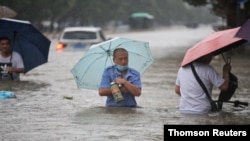At least 25 people are dead in China’s central Henan province after massive floods triggered by several days of heavy rains. Weather forecasters are predicting three more days of rain for the region.
The rains washed out streets throughout the provincial capital, Zhengzhou, forcing stranded motorists to wade through waist-deep waters that submerged cars and sent many floating away.
The floods also washed out the city's subway system, with riders posting videos on social media awaiting rescue in waist-high muddy waters. A passenger named Xiaopei posted on Weibo that “the water in the carriage has reached (their) chest.”
Twelve people died and more than 500 were rescued after a subway tunnel flooded, state media reported.
Dozens of reservoirs and dams have reached critical levels, with local authorities warning that the Yihetan dam in the nearby city of Luoyang had sustained a 20-meter breach and was on the verge of imminent collapse.
Authorities have evacuated 100,000 residents to safe zones. The central government dispatched units of the People's Liberation Army and the People's Armed Police to assist with flood control and relief efforts, according to Zhao Lijian, a spokesperson for China’s Ministry of Foreign Affairs.
“Our hearts go out to the people in affected areas. We believe that the people of Henan will tide over the disaster and do a good job in flood control and disaster relief as well as post-disaster recovery,” he said, adding that there had not been any reports of foreign casualties in Henan.
Henan province, home to about 94 million people, has experienced severe rains through the past week. Forecasters say Zhengzhou received as much rainfall in three days as it normally gets in a year.
On July 19, the Meteorological Administration posted a warning on its official Weibo account that said, "Tonight to tomorrow during the day Zhengzhou area will have rainstorms, some areas will have torrential rain. Please avoid low-lying, waterlogged sections and drive safe."
A media worker in Zhengzhou, who asked to remain anonymous for fear of retaliation from authorities, told VOA Mandarin on July 20 that she didn’t take the warning seriously at first. “There was nothing two days ago. It started to rain yesterday and hasn’t stopped today. Now the city roads are full of stagnant water.” She added that cars were drifting in the flooded roads.
"I am really scared about the power failure and being at home alone,” posted one resident on Weibo. “My cell phone is dying, and water is leaking in through the balcony. I’m sitting on the floor, crying.”
Other netizens asked for help online, "We have a pregnant woman at home whose water broke. The baby is coming any minute. We waited for the ambulance but were told they can’t send any. Can any OB doctors or hospitals nearby help?”
A representative of the city of Xu Liyi, a member of the Standing Committee of Henan Provincial Party Committee, and secretary of the Zhengzhou Municipal Party Committee said the high levels of rainfall were unusual.
Extreme weather events have surged this summer in China, with recent flooding in Sichuan province killing hundreds of citizens and forcing thousands to evacuate the area. Officials of Greenpeace International, an environmental group, warn that China’s rapid urbanization will increase the frequency of climate disasters.
In Beijing, where heavy rains flooded some neighborhoods, a real estate agent who wanted to remain anonymous told VOA Mandarin that the intensity of the current rainstorms is similar to those that left dozens dead in 2012.
“My coworkers live in Beijing Tiantongyuan. Their cars are flooded with water covering the wheels,” he said, adding that the rains had caused roads to collapse and big rocks to come loose and careen down steep areas.
Speaking to the Chinese media, Liu Junyan of Greenpeace said that “because of the highly concentrated population, infrastructure and economic activity, the exposure and vulnerability of climate hazards are higher in urban areas.”
Some information came from The Associated Press, Agence France-Presse and Reuters.




